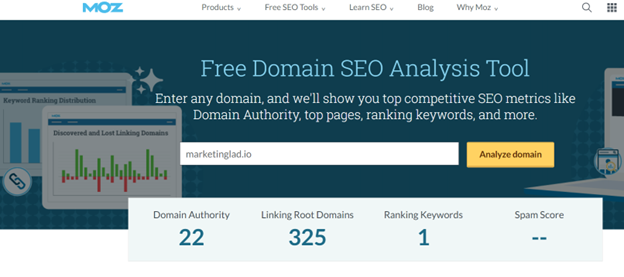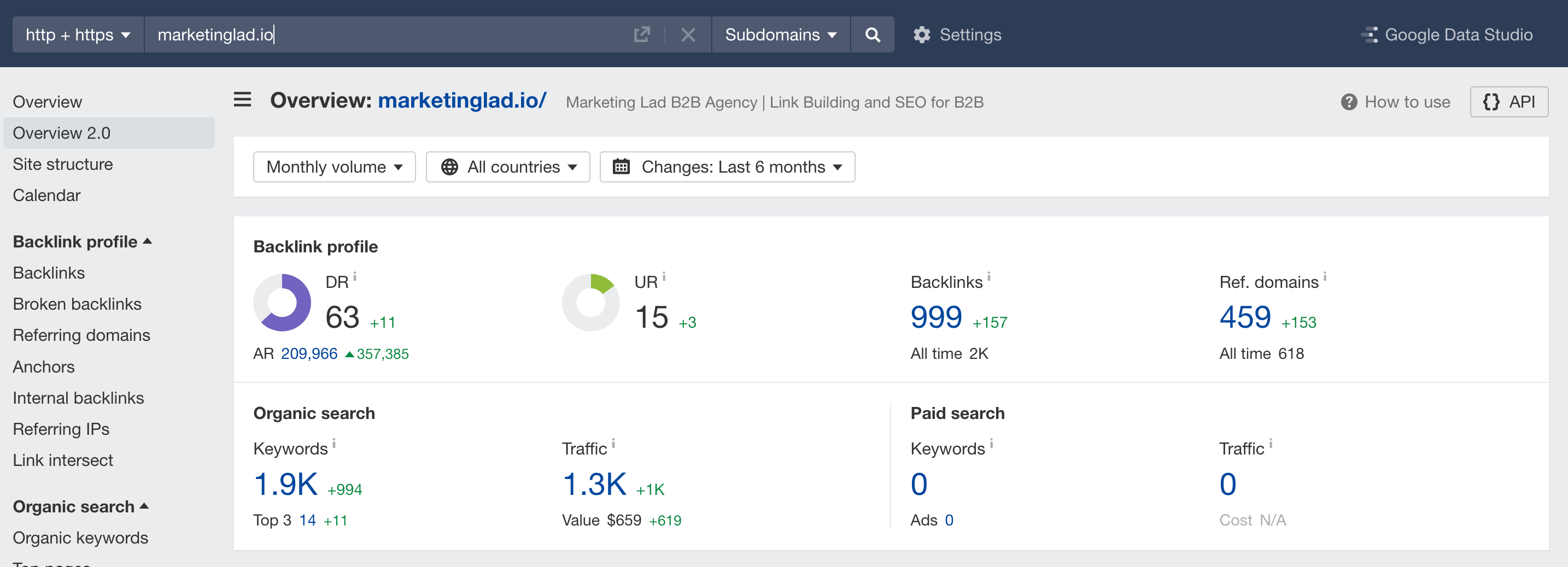Last Updated on 17/08/2025
SEO professionals often utilize domain authority (DA) and domain rating (DR) as ranking variables. Agencies and consultants often use these crucial criteria to evaluate the effectiveness of new campaigns and compare them to those of the past.
However, beginners often mix up DA and DR metrics.
This article provides an in-depth explanation of Domain Authority (DA) and Domain Rating (DR).
WHAT IS DOMAIN AUTHORITY?
A website’s domain authority, often referred to as thought leadership, describes its relevance to a specific subject or sector. Moz created a domain authority score for search engine rankings. This relevance directly influences how highly it ranks, as search engines utilize automated analytical algorithms to determine domain authority.

Scores for domain authority range from 100, with higher scores indicating a greater likelihood of ranking. To accurately determine the best-fit algorithm that most closely reflects the ranks of thousands of actual search results used as benchmarks to scale against our link data, the Domain Authority calculation itself employs a machine learning model.
Due to the importance of domain authority for website placement in SERPs, a whole industry of Black Hat SEO companies emerged in an effort to pretend to have a higher level of domain authority. Major search engines rate websites in relation to the entirety of websites on the Internet, regardless of a website’s business or topic matter, for example, Google’s PageRank.
The SERP page’s findings establish the PageRank in relation to a particular keyword. Since search engines list the top-ranked pages that match certain search keywords first in the SERPs, even websites with low PageRank can achieve excellent visibility in search engines in a less competitive area.
HOW IS DA DETERMINED?
A single DA score is derived by taking into account several variables, including the number of connected root domains and total links. Then, you can compare websites using this rating or track a website’s “ranking strength” over time. The DA has no impact on the SERPs and is not a Google ranking criterion.
The machine learning algorithm’s predictions about how frequently Google would utilize a domain in its search results are used to compute a domain’s DA score as of the Domain Authority 2.0 upgrade at the beginning of 2019. If domain A is more likely than domain B to show up in a Google SERP, then we would assume that domain A’s DA would be higher than domain B’s DA.
Because DA works on machine learning calculations. Your site’s score will frequently vary when more, fewer, or different data points become available and are included in those computations. For instance, if Facebook.com were to acquire a billion new links, every other website’s DA would fall short of Facebook’s. There will be fewer high DA spaces available for other domains with weaker link profiles, as more established and authoritative domains, such as Facebook, will have progressively larger link profiles. As a result, increasing your score from 20 to 30 is far simpler than increasing it from 70 to 80. Because of this, it’s crucial to utilize DA as a comparative indicator rather than an absolute one.
HOW DO I FIND OUT THE DOMAIN AUTHORITY OF MY WEBSITE?

Using Moz’s Link Explorer, MozBar (Moz’s free SEO toolbar), or the SERP Analysis component of Keyword Explorer, you can determine the DA of any website. Moz Pro campaigns, the Moz API, and numerous SEO and online marketing tools integrate with Domain Authority analytics.
HOW CAN YOU INCREASE the DA of THE WEBSITE?
The DA score of a website is based on several variables. Therefore, a web administrator, blogger, or SEO specialist should concentrate on the following points in order to raise a website’s DA score.
- The domain age of a website is the first factor to concentrate on for raising the Domain Authority (DA) score of a website. From the perspective of search engines, an older website typically has a higher domain authority than a new one.
- The second factor to consider for a higher DA score is the quality of unique backlinks. A blogger should therefore prioritize getting backlinks from websites with better DA scores. Additionally, using a single backlink from a single domain is better for the DA score than using several backlinks from the same page.
- Google is one of the most popular search engines. To rank and index a website, it focuses on its mobile friendliness. Because a mobile-friendly website will have a higher DA score than a non-mobile-friendly website, a web administrator should focus on building a mobile-friendly website.
- The fourth factor to consider for a better DA score is the number of social signals. A website with more social shares than other websites will have a higher DA score.
- Another crucial factor that DA checkers consider when calculating a website’s Domain Authority (DA) score is the quality and quantity of its content. A website’s DA score will be higher than that of other websites if it has a larger volume of high-quality content.
- SEO experts generally work and improve the technical, off-page and on-page SEO aspects of a blog or website. In addition to the aforementioned reasons, doing so will raise the DA score of the website.
WHAT IS DOMAIN RATING?

The relative strength of a website’s backlink profile, according to the Ahrefs metric, is Domain Rating (DR). The more high-authority backlinks mean a high DR. It fits a logarithmic scale from 0-100, with 100 being the highest possible score.
HOW ARE DOMAIN RATINGS DETERMINED?
DETERMINE DOMAIN RATINGS BASED ON THE CRITERIA BELOW
We compute DR in a manner that roughly resembles PageRank. The primary distinction between DR and PageRank is that while DR is measured across websites, PageRank is calculated between pages.
Technically, it appears as follows:
- Every domain with at least one link to the target domain is located.
- We count the number of other domains to which each connecting domain is pointed.
- The ‘’DR juice’’ from each linked domain is subsequently sent to the target domain. You can understand the quantity by dividing the linking site’s DR by the total no of unique sites it links to.
Although this explanation is oversimplified, it does effectively convey how we determine the DR of a particular website.
Let’s put this in a more useful way:
- Your DR won’t rise if a website just uses no-follow links to link to you.
- The only link from a domain that will raise your DR is the first one. All further connections have no further impact on your DR.
- The quantity of ‘’DR juice’’ that a website (which has previously connected to you) is delivering to you will gradually decrease if it keeps connecting out to more and more new websites. So gradually, your own DR might also decline.
- A website that connects to you will start sending more traffic as its DR rises.
HOW CAN A WEBSITE IMPROVE ITS DOMAIN RATING?
An SEO specialist should focus on the following aspects to increase the DR score of their website or blog, while also considering the previously mentioned issues.
- Increase the number of do-follow links that direct users to the primary website.
- Use links from websites with better Domain Ratings whenever possible.
- Make an effort to expand the number of websites that connect to the primary website.
- Increase the number of websites that point to the primary website from a domain.
DOES DOMAIN RATING MATTER FOR INCREASING SEARCH TRAFFIC?
Although DR and a website’s search traffic have a high correlation. You shouldn’t concentrate your efforts on boosting this particular measure. Unlike websites, Google ranks pages. Therefore, you should focus your efforts on creating high-quality content and acquiring high-quality backlinks that link to it. As a result, both your DR and your search traffic will increase naturally.
CONCLUSION ON DR VS. DA
It is evident from a comparison of Domain Rating and Domain Authority. Both have established themselves in the SEO community as valuable indicators of future SEO performance.
Both DA and DR have a positive relationship with each other, as well as higher organic traffic to a domain. Increasing domain authority and domain rating scores can have a favorable link with other SEO metrics.
For instance, overall keyword ranks & higher organic traffic make it advantageous to use both measures for comparison and analysis.
P.S: Read our


